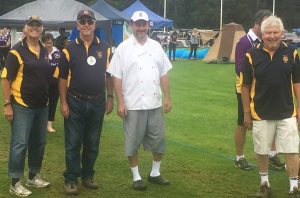Short words by Bob Ant.
Welcome rain this week resulted in a quick change of venue for our BBQ meeting – back to the Golf Club (which they handled magnificently at such short notice).

Many thanks to Merinda who at the last minute came along to talk about the National Music Teacher Mentoring program and sang a few songs, which made the night. Although small in numbers, I think everyone enjoyed themselves.
The Cancer Council Relay For Life was well supported despite the rain. Fortunately, the rain held off on Sunday morning long enough for us to feed the hordes over breakfast. We grossed $370 plus. That was after we gave a $50 donation and covered our expenses. On Saturday, the Lions handled lunch and Sunday morning (early) John Doyle, Bob Aston, Angie, Lynn, Peter Hartley, Mike Young and myself kept the bacon and eggs going for the masses while Rolfe was swamped making coffee. A job well done and top marks to the organisers of this wonderful event. I’m sure they are going to make good money for a very worthy cause.
Lynda and Ashley had to dash north on Thursday and made it just in time to say “goodbye” to Ash’s mother. Our thoughts as they are with Michael and Donna. It is not an easy time.
John Doyle has a few holes in the roster for next week’s markets, if you have a little time to spare please let him know.
Have a great and safe week
Bob
The Week that Was

Last Thursday we changed venue at very short notice due to the rain. Only 9 members and 3 guests made it to the meeting with the weather, golf trips, holidays, family emergencies and illness and injury contributing to the high absentee rate. As Bob has indicated Merinda came to the rescue at the last movement to keep us entertained as our guest speaker and performer – thank you Merinda for a great evening. As well as Merinda, we were honoured to have Iris and Julie Hartley as guests.
Last Sunday morning the club provided breakfast at the Eurobodalla Relay for Life, as Bob has indicated we were kept busy feeding participants and spectators with high quality bacon and eggs.
Busking Competition
Sandra and the team continue to do a great job organising the Australian National Busking Regional Championship at Narooma. Please keep 27 May free as the committee will need all hands-on deck to help. (And don’t forget the markets on 28 May). Have a look at the great clip advertising the Championship.
The Week Ahead
This week our guest speaker will discuss the Learner Driver Mentor Program – unfortunately I have no information to share with you about the program so Thursday night should be a surprise.
And don’t forget our monthly market this Sunday.
Some Trivia – From Di Lovett via Peter & Karen Bull
Why do men’s clothes have buttons on the right while women’s clothes have buttons on the left?
Because when buttons were invented, they were very expensive and worn primarily by the rich. Since most people are right-handed, it is easier to push buttons on the right through holes on the left. Because wealthy women were dressed by maids, dressmakers put the buttons on the maid’s right! And that’s where women’s buttons have remained since.
Why do ships and aircraft use ‘mayday’ as their call for help?
Because this comes from the French word m’aidez – meaning ‘help me’ – and is pronounced, approximately, ‘mayday.’
Why are zero scores in tennis called ‘love’?
Because in France, where tennis became popular, the round zero on the scoreboard looked like an egg and was called ‘l’oeuf,’ which is French for ‘the egg.’ When tennis was introduced in the US, Americans (naturally), mispronounced it ‘love.’
Why do X’s at the end of a letter signify kisses?
Because in the Middle Ages, when many people were unable to read or write, documents were often signed using an X. Kissing the X represented an oath to fulfill obligations specified in the document. The X and the kiss eventually became synonymous.
Why is shifting responsibility to someone else called passing the buck’?
Because in card games, it was once customary to pass an item, called a buck, from player to player to indicate whose turn it was to deal. If a player did not wish to assume the responsibility of dealing, he would ‘pass the buck’ to the next player.
Why do people clink their glasses before drinking a toast?
Because in earlier times it used to be common for someone to try to kill an enemy by offering him a poisoned drink. To prove to a guest that a drink was safe, it became customary for a guest to pour a small amount of his drink into the glass of the host. Both men would drink it simultaneously. When a guest trusted his host, he would only touch or clink the host’s glass with his own.
Why are people in the public eye said to be ‘in the limelight’?
Invented in 1825, limelight was used in lighthouses and theatres by burning a cylinder of lime which produced a brilliant light. In the theatre, a performer ‘in the limelight’ was the Centre of attention.
Why is someone who is feeling great ‘on cloud nine’?
Because types of clouds are numbered according to the altitudes they attain, with nine being the highest cloud. If someone is said to be on cloud nine, that person is floating well above worldly cares.
In golf, where did the term ‘Caddie’ come from?
Because when Mary Queen of Scots went to France as a young girl, Louis, King of France, learned that she loved the Scots game ‘golf.’ He had the first course outside of Scotland built for her enjoyment. To make sure she was properly chaperoned (and guarded) while she played, Louis hired cadets from a military school to accompany her.
Mary liked this a lot and when she returned to Scotland (not a very good idea in the long run), she took the practice with her. In French, the word cadet is pronounced ‘ca-day’ and the Scots changed it into caddie.
Why are many coin collection jar banks shaped like pigs?
Because long ago, dishes and cookware in Europe were made of dense orange clay called ‘pygg’. When people saved coins in jars made of this clay, the jars became known as ‘pygg banks.’ When an English potter misunderstood the word, he made a container that resembled a pig. And it caught on.
